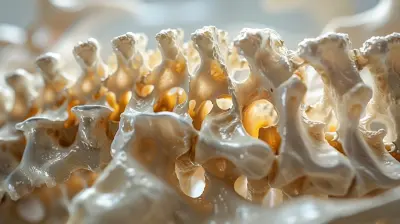5 December 2024
Aging is a beautiful part of life, but let’s be real—nobody enjoys the aches and sniffles that seem to tag along as the years go by. Wouldn’t it be amazing to feel vibrant, energetic, and full of zest well into your golden years? The secret sauce to that vitality? A strong immune system! Think of your immune system as your very own personal bodyguard—it fights off harmful intruders and keeps your body running smoothly.
But as we age, our immune system doesn’t quite have the spring in its step that it once did. Don’t worry though, there’s plenty we can do to give it a boost! In this article, we’ll dive into practical tips and lifestyle tweaks for strengthening your immunity, so you can enjoy a healthier, happier old age. Ready? Let’s get started! 
Why Does Immunity Weaken With Age?
First, let’s address the elephant in the room: why does your immune system slow down as you age? Well, it’s not a malfunction—it’s just biology. Over time, our bodies naturally undergo changes that can affect how well our immune system works. For example:- Reduced T-cell production: T-cells are like the frontline soldiers in your immune army. As you age, your body doesn’t produce them as efficiently.
- Chronic inflammation: Sometimes, your immune system can get stuck in overdrive, leaving your body feeling like it’s constantly fighting a battle.
- Slower response time: Ever wonder why it takes longer to recover from colds and flu as you grow older? Your immune system’s response time can drag its feet a little with age.
But the good news? You’re not powerless here. There are plenty of strategies to keep your immune system sharp and resilient. 
1. Nourish Your Body with a Healthy Diet
Let’s face it—you are what you eat! Feeding your body nutritious, whole foods is the foundation for a strong immune system. But what does “healthy eating” actually look like?Pack Your Plate with Immune-Boosting Nutrients
- Vitamin C: Think of it as the ultimate immune booster. Citrus fruits, strawberries, and bell peppers are loaded with it.- Vitamin E: This antioxidant powerhouse is found in nuts, seeds, and spinach.
- Zinc: Zinc is like the handyman of your immune system, helping repair and strengthen cells. You’ll find it in foods like seafood, beans, and whole grains.
Go Big on Fiber
Fiber isn’t just great for digestion—it supports your gut microbiome too! Since nearly 70% of your immune cells are in your gut, keeping it healthy is non-negotiable. Load up on fruits, veggies, whole grains, and legumes to keep things running smoothly.Stay Hydrated
Your cells can’t fight the good fight if they’re dried out! Make it a habit to drink plenty of water throughout the day. Herbal teas are another excellent option if plain water feels boring.
2. Move Your Body Regularly
Exercise is like a magic pill for your immune system—except it’s free! Regular physical activity gets your blood pumping and helps immune cells circulate more efficiently.You don’t need to train for a marathon (unless you want to!). Gentle exercises like walking, yoga, or swimming are fantastic for older adults. The key here is consistency. Aim for at least 30 minutes of moderate activity most days of the week. Think of it as a gift to your future self! 
3. Prioritize Quality Sleep
Ah, sleep—the underrated superhero of good health. When you’re snoozing, your body is hard at work repairing itself and producing infection-fighting molecules. If you’re skimping on shut-eye, your immune system might be running on empty.Here are some tips for better sleep:
- Stick to a regular sleep schedule.
- Create a calming bedtime routine, like reading or meditating.
- Keep your bedroom cool, dark, and quiet.
- Avoid caffeine or heavy meals too close to bedtime.
If sleep troubles persist, don’t hesitate to consult a healthcare professional. Sleep is way too important to ignore!
4. Manage Stress Like a Pro
Let’s not sugarcoat it—aging can come with its fair share of stressors. But too much stress is kryptonite for your immune system. Chronic stress releases cortisol, a hormone that can suppress immune function over time.So, what can you do? Develop a stress-management toolkit! Here are some ideas:
- Practice mindfulness: Even a few minutes of deep breathing or meditation can work wonders.
- Stay socially connected: Loneliness and isolation can weaken immunity, so make time for friends and family.
- Rediscover hobbies: Whether it’s gardening, painting, or dancing to your favorite tunes, doing what you love can pull you out of the stress zone.
5. Don’t Skimp on Routine Checkups
Prevention is always better than cure, right? Regular checkups with your doctor can help spot potential issues before they turn into bigger problems. Vaccines, like the flu shot or pneumonia vaccine, are particularly important for older adults.Think of these appointments as tune-ups for your body—just like taking your car in for service, except way more important!
6. Kick Bad Habits to the Curb
We all have that one vice that’s hard to let go of, but some habits can be especially hard on your immune system. Smoking, for example, weakens your body’s ability to fight off illnesses. Similarly, excessive alcohol consumption can impair immune function.Not saying you have to be a saint—life’s too short to never have a glass of wine! But moderation is key. Opt for healthier habits, like sipping on green tea or snacking on nuts instead of reaching for a cigarette or sugary drink.
7. Soak Up Some Sunshine for Vitamin D
Here’s a fun fact: Vitamin D is nicknamed the “sunshine vitamin” for a reason! It plays a crucial role in keeping your immune system strong. Spending 10–30 minutes outdoors a few times a week can help your body produce enough of it.But if getting outside isn’t always feasible (hello, winter!), consider a vitamin D supplement. Of course, check with your doctor first to make sure it’s right for you.
A Word on Supplements
Speaking of supplements, let’s clear the air: they’re not a magic cure-all. While certain supplements—like vitamin C, zinc, and elderberry—can give a little extra boost, it’s best to focus on a balanced diet first. Consider supplements as more of a safety net than the main event. And always consult your healthcare provider before starting anything new!Stay Positive and Stay Grateful
Lastly, let’s talk about the power of positivity. Believe it or not, your mental health and immune system are closely connected. Practicing gratitude, laughing often, and finding joy in the little things can have a profound impact on your overall health.Think of laughter as an internal workout—it reduces stress hormones and boosts immune cells. So go ahead, watch that funny movie or call up a friend who always cracks you up. Your immune system will thank you!
Wrapping It Up
Boosting immunity for a healthier, happier old age isn’t about making drastic changes overnight. It’s about small, consistent tweaks that add up over time. From eating nutrient-packed foods to staying active, prioritizing sleep, and soaking up some vitamin D, there are countless ways to support your immune health.Remember, it’s never too late to invest in your wellbeing. So start where you are, use what you have, and do what you can. Future-you will be so grateful!









Audra Sharpe
Thank you for this informative article! It’s inspiring to see practical tips for enhancing immunity. Taking proactive steps toward health can truly lead to a happier and healthier later life.
March 7, 2025 at 5:07 AM